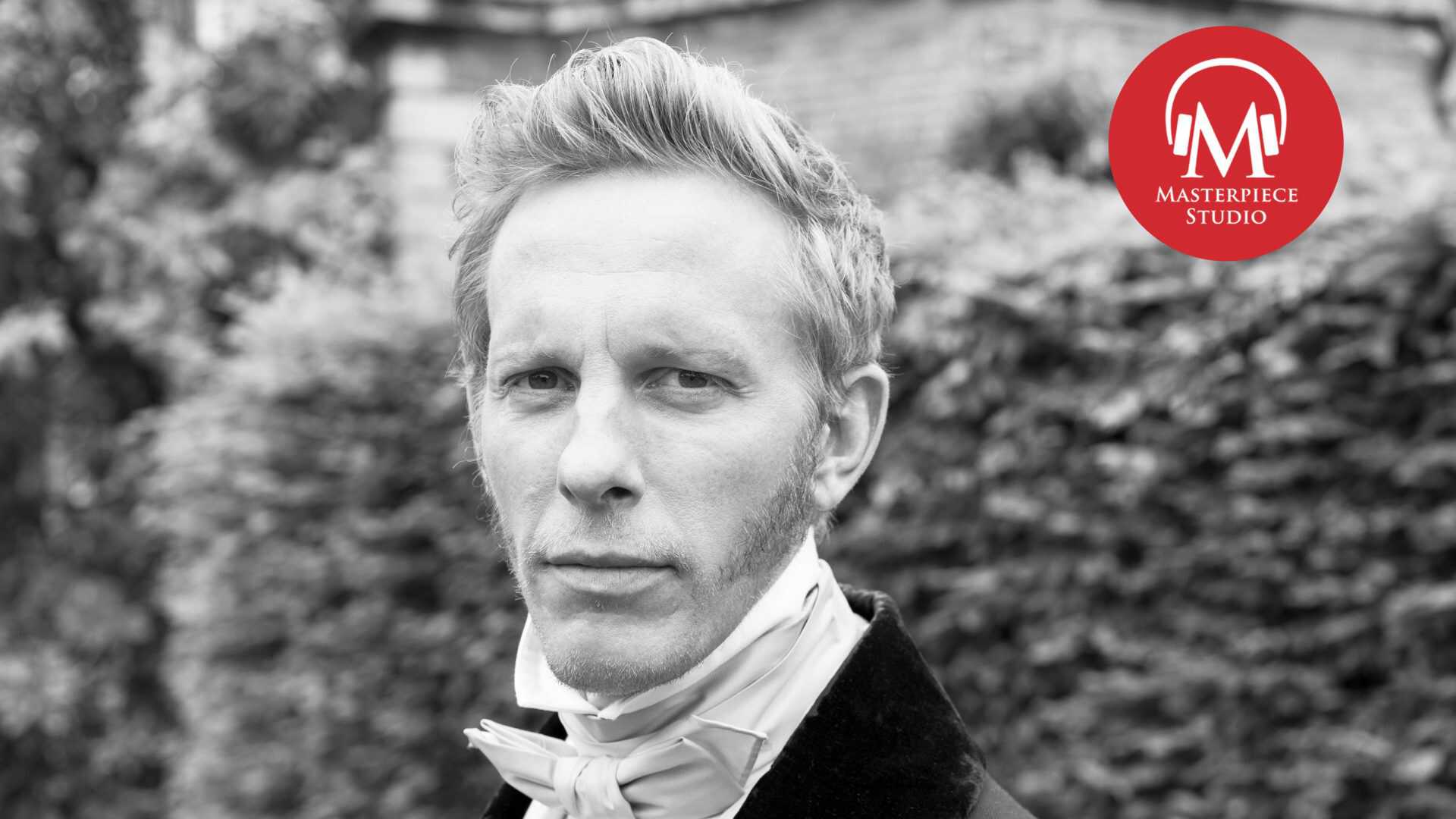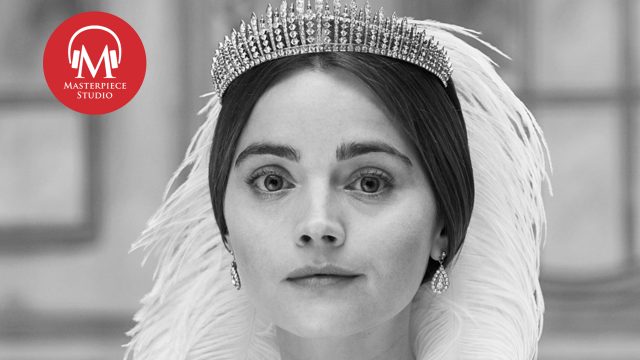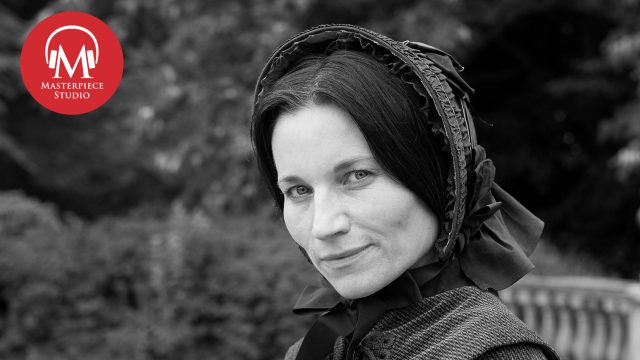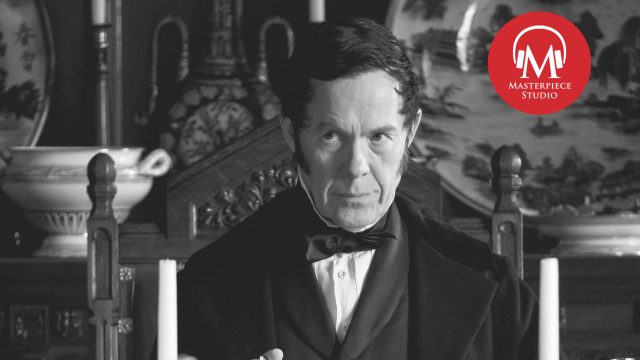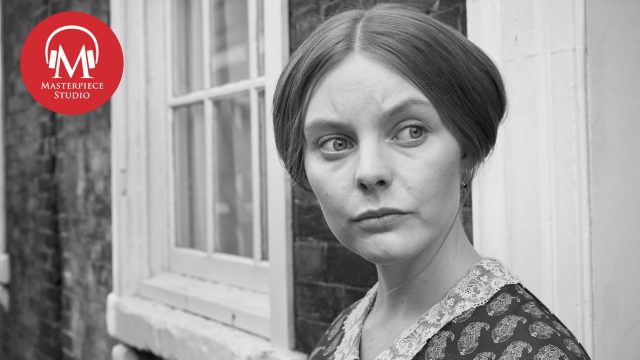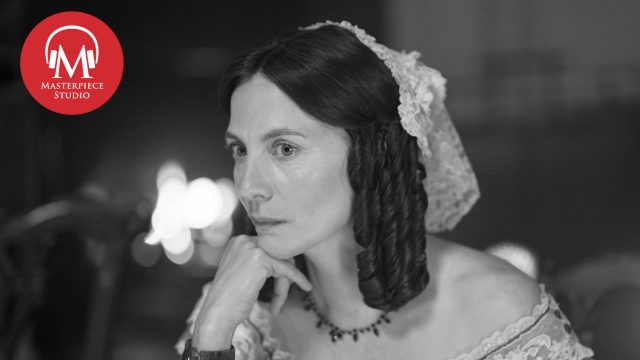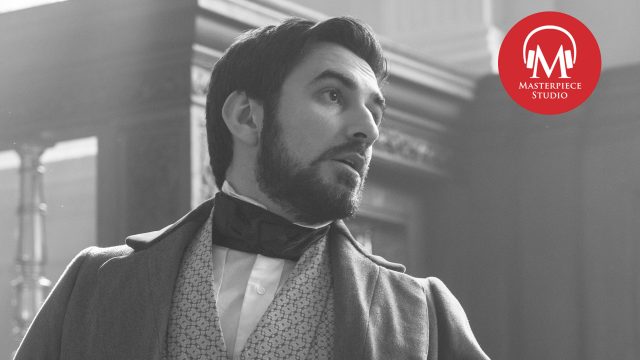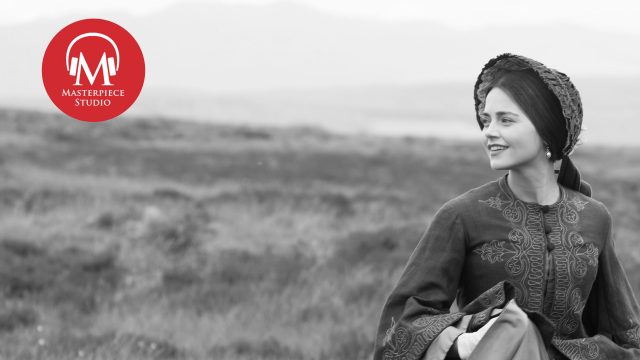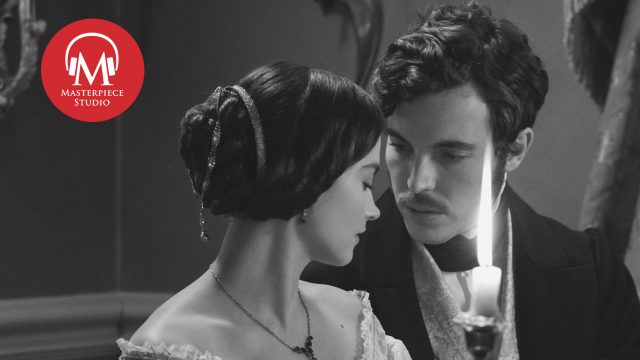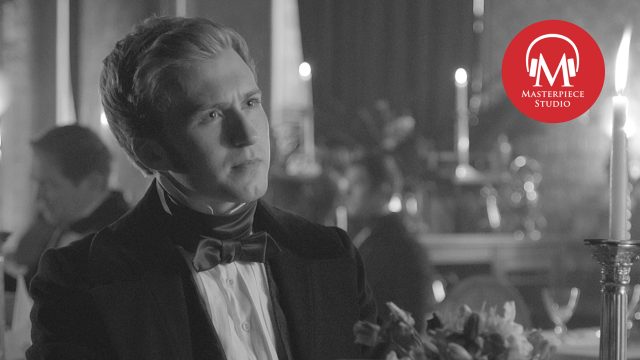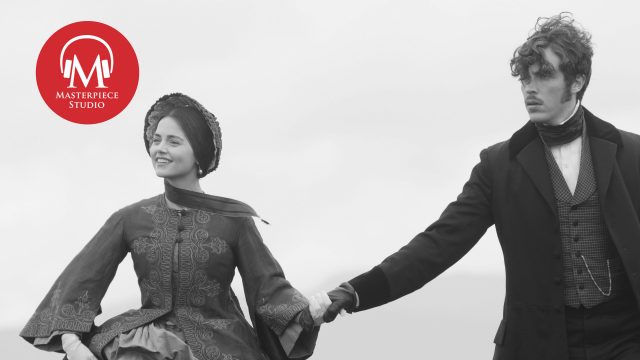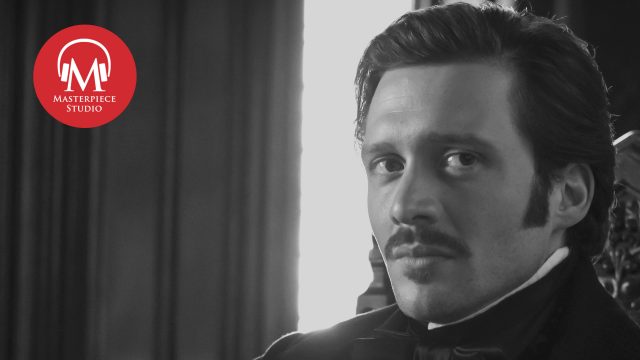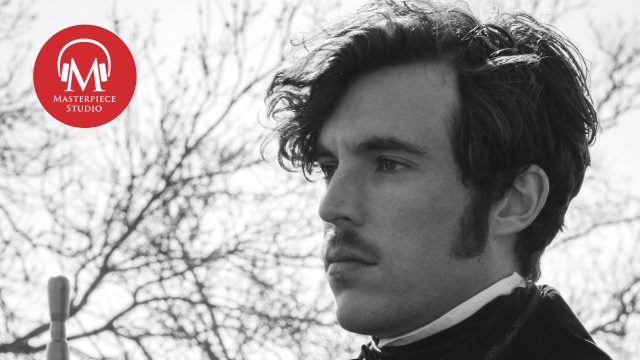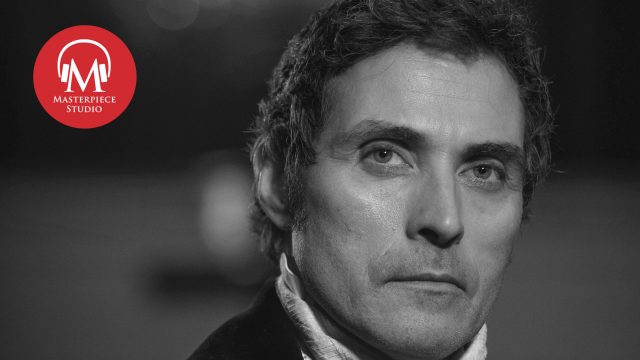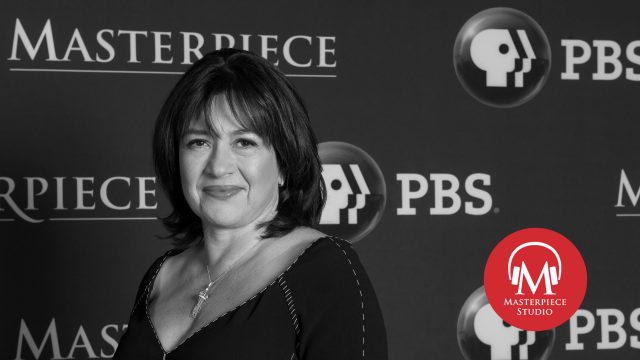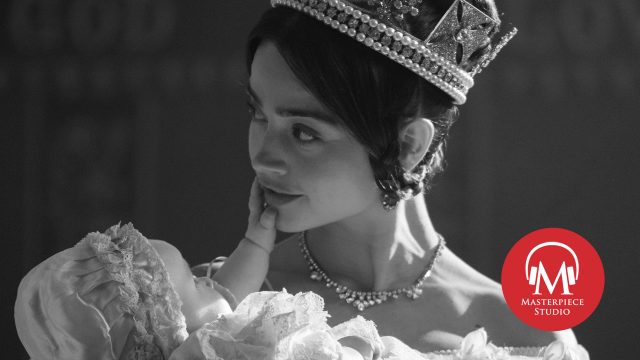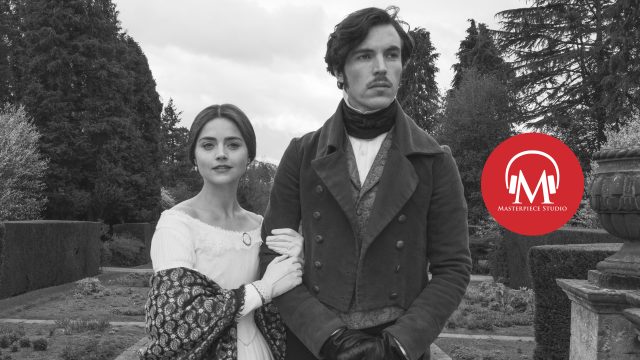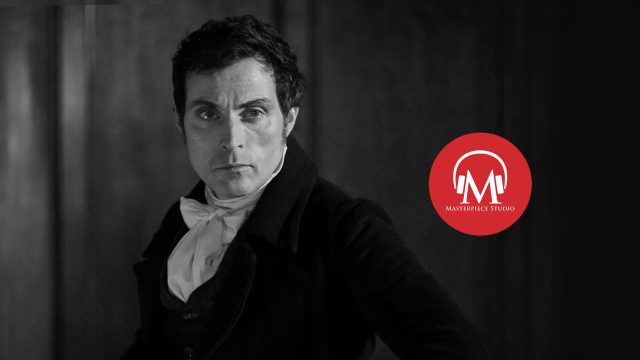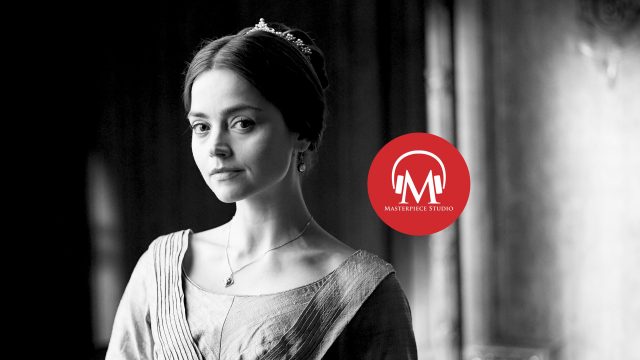Laurence Fox is well known to MASTERPIECE viewers after his eight seasons on the beloved series Inspector Lewis, so his appearance on Victoria as the devious UK Foreign Secretary, Lord Palmerston, is a welcome return to the screen. Fox offers hints as to how he and actor Jordan Waller got up to mischief on set, as well as how the cane-twirling Lord Palmerston came to find himself with a cane in the series.
Download and subscribe on: iTunes | Spotify| RadioPublic
Transcript
Jace Lacob: I’m Jace Lacob, and you’re listening to MASTERPIECE Studio.
The halcyon days of Queen Victoria’s early political life with the charming Lord Melbourne are long over. And no one character best represents the rough-and-tumble realities of the Queen’s new political life than Henry John Temple, Lord Palmerston, her new Foreign Secretary.
CLIP
Lord Palmerston: Your majesty, your royal highness.
Victoria: Do you know why we asked you here?
Lord Palmerston: Because I’m an asset to any gathering ma’am?
Albert: We have been informed that you have been corresponding with the revolutionary government in France.
Jace: He’s remarkably popular and highly populist, effortlessly shifting from the highest halls of power to a casual corner prizefight in the park. And his oh-so-smooth persona quickly comes to grate on Victoria’s nerves.
CLIP
Lord Palmerston: Perhaps you don’t quite understand what these Chartists have in mind.
Victoria: Actually, Lord Palmerston, I have spoken with a Chartist. Can you say the same?
Lord Palmerston: With respect, ma’am, one conversation doesn’t make one an expert.
Jace: Actor Laurence Fox is no stranger to MASTERPIECE viewers, after his eight-season run as DI James Hathaway on the beloved Inspector Morse spin-off series, Lewis. As Lord Palmerston, however, Fox finds great fun in a brand new character.
Laurence Fox: Palmerston knows a knows a bullshiter when he sees one…I think he rather likes Feodora and he likes the fact that she schemes and it’s a fun game but you know in the end he’s got very serious motives so they’re peas in a pod, those two.
Jace: We speak to Fox about the real Lord Palmerston, how it feels to play a savvy political operator and his upcoming album.
And later, Victoria creator, head writer, and executive producer Daisy Goodwin will unpack the historical realities of Lord Palmerston in a new round of Victoria Fact or Fiction.
Jace: And this week we are joined by Victoria star Laurence Fox. Welcome.
Laurence: Hi. How are you doing?
Jace: You joined the cast of Victoria this season as the vainglorious Henry Temple, Lord Palmerston. What did you make of the character when you first read the scripts for season three?
Laurence: When I first read the script I was pretty chuffed I have to say. I thought, this is going to be fun. He’s quite a naughty man isn’t he? So it was a great stretch for me as an actor because I’m so well-behaved, usually.
Jace: Palmerston’s first scene is an impassioned speech in the House of Commons.
CLIP
Lord Palmerston: The autocrats of Europe will lie uneasy in their beds tonight, knowing that the French people have risen up against an unjust King. There is a tide of liberty abroad which taken at the flood will lead on to fortune!
Jace: What does this speech say about Palmerston as a politician and his allegiances?
Laurence: I think that Palmerston was appealing to the sort of populist touch wasn’t he? You know, they’re quite keen to draw parallels between the eras that we’re looking at and I think Palmerston is a bit of a populist, in his way, and he makes no bones of letting the monarchs know that their time on the throne should be numbered, or at least their power over the people.
Jace: I mean he is, in a sense, the sort of ultimate political operator. He’s very cannily leveraging the public’s love for his man of the people persona in order to secure his own agenda. What do you see as being that, as in his own agenda?
Laurence: I never get the sense that he’s acting. I mean I know they say he’s vainglorious. But I think there’s a nobility to what he is trying to achieve. You know, he likes to create chaos, and then through that chaos, broaden and widen Britain’s influence in the world, which he succeeded in doing. And you know, he didn’t back down, and wouldn’t back down, which I rather admire, I have to say.
Jace: How much research did you do into the real-life Palmerston, particularly at this juncture in his career?
Laurence: I started reading the biography of him, and then I stopped reading it, because ultimately the older I get, the more acting I do, the more I think your job is to serve the script and deliver the vision of the writer and the director. You’re part of a machine, essentially. So I just stopped, and I started playing the scenes, and that made it easier. Because, you know, I read that he wasn’t a particularly brilliant orator, but in the scripts he’s rather a good orator. So, you know, it would confuse me to go on to set and go, ‘Well maybe I should not be a good orator?’ Then I think, ‘Well I’m not really serving the script here, so let’s leave that, and play the scene as it is and hopefully it works better.’ That’s my theory. I’m not sure Daniel Day-Lewis would agree with me.
Jace: He definitely displays some virulent anti-monarchical tendencies here. At one point referring to the members of Victoria’s own family as despots. How sincere is he in these beliefs?
Laurence: I think it’s that classic British thing of, you know, turning your nose up slightly to authority. You know, we live in this very held-together constitutional monarchy. And, you know, one of the bonuses of being British is that one can turn one’s nose up slightly at it. I think he does a lot of it for effect, and he pushes people to see how they’ll react to him more than he’s you know, absolutely anti-monarchist because I don’t think he is particularly. He’s certainly not in the series. He’s just looking to test her mettle, I think mainly. He wants to see what she can take, and Jenna did a very long pause after my first line when I called her a despot and I thought, ‘I wonder why she’s pausing for such a long time?’ and then I watched it in ADR and I thought, ‘Ah, she’s furious. I get it.’
Jace: That’s amazing. Palmerston and Russell’s dynamic is so intriguing to watch. Despite being the PM, Russell seems continually cowed by Palmerston. What sort of political power does Palmerston have behind him that scares Russell so much?
Laurence: Well I think that Russell is a career politician isn’t he, so he’s not into charisma and he’s not ebullient or effusive, he wants to get the job done. And Russell is a very serious character and I think Palmerston just enjoys winding him up. Because he just thinks, ‘This’ll be fun. Let’s see how I can wind up Russell.’ And John Sessions, who plays Russell, is an old friend, so we sort of took a bit of our relationship into it, which is, I’m the naughty schoolboy and he’s the grown-up and I decided that that would be a good way of dealing with it.
Jace: I mean he does walk away with some of the finest lines of dialogue this season, some of which are factual, like his, ‘If I were not an Englishman I would wish to be an Englishman’ jab, while others are invented. What did you make of Daisy Goodwin’s scripts for Victoria, and specifically Pam’s dialogue?
Laurence: I think Daisy’s very excitable and she loves it, and you can always tell when a writer loves doing what they do, because their scripts are very easy to act. Sometimes one is left with, you know, performing seriously put together scripts which wouldn’t really suit this particular genre, you know, very, very heavy and worthy scripts and they’re very difficult to bring off the page. But because Daisy is so excitable and she enjoys writing and she would giggle when she was on set, she’d go, ‘Do more, do more, yes do more,’ even the directors are pulling their hair out saying, ‘Please don’t do that.’ And she would be going, ‘Do more, do more.’ It’s brilliant to act, and she doesn’t mind being naughty, which is also fun.
Jace: He can speak German, French and Italian. He can balance his walking stick on his palm. He has a silver tongue and a love of gambling and the ladies. Is Palmerston as deliciously fun to play as it looks?
Laurence: Yes, very much so. I did have a few qualms about that balancing the cane on the hand thing. I thought, that’s not that impressive to do, especially when one’s trying to remember how to speak German. It was such a pleasure to do, and the cane I’d nicked from wardrobe because I wanted to be a bit like Willy Wonka. So I nicked the cane and the cane then became a feature, which is great because actors sometimes get what’s called acting hands, where you’re not quite sure what to do with your hands. So if you’ve got a cane in your hand, you just twirl the cane baby, twirl the cane.
Jace: Palmerston and Victoria engage in a verbal and political tug of war. Why is Palmerston immune to the Queen’s charms at first, and why does he come around?
Laurence: There’s an element of, ‘Is she up to the job?’ which you know, is sort of mildly sexist, I suppose, in a way, but would probably not have been sexist in those days. And I think he’s someone who likes to test people’s mettle. So when he finds her reasonable and strong-willed he begins to admire her. If he sees in other people what he sees in himself he warms to her substantially, actually. And he can see that he can be of use to her, and he does want to be useful, he’s not just in it for the japes.
Jace: He is somehow quite able to get under Albert’s skin. Why does he take such pleasure in needling the prince?
Laurence: It’s the classic English being slightly mean to the Germans thing that the Brits have done throughout the ages. And in his mind Albert’s not really relevant to this situation, and it’s only through Victoria’s understanding of Albert that he understands that, you know, he’s going to have to get Albert onside at some point, which he does make an effort to do later in the day. But you know, as he says, ‘Confusion abroad and peace and stability at home.’ He tries to create a bit of chaos and confusion with Albert, and that’s a political move to try and get Victoria do what he says and to cut Albert out of the equation, I think that’s why he’s aiming to do.
Jace: Feodora catches Palmerston sneaking into Sophie’s room and blackmails him. How would you describe Palmerston’s relationship with the Queen’s scheming half-sister?
Laurence: Feodora and Palmerston. Well, they’re sort of cut from the same cloth aren’t they, you know, in a way. Palmerston knows a bullshiter when he sees one. I think he rather likes Feodora and he likes the fact that she schemes. It’s a fun game, but you know, in the end he’s got very serious motives so. They’re peas in a pod, those two, and I always thought they should probably have a snog, but never happened. He loved his wife too much.
Jace: I think that my one of my favorite scenes this season is the picture card exchange between Palmerston and Feo which does crackle with this dangerous energy that borders on the sexual.
CLIP
Palmerston: New pearls, madam?
Feodora: You force me to play my card.
Palmerston: What card is that?
Feodora: The picture card. The one that shows you at Osborne, attempting to ravish the Duchess of Monmouth.
Palmerston: Your Serene Highness. I think we might be quits.
Jace: What was it like filming that confrontation between the two of them? You touch her cheek in a way that is very forward.
Laurence: Yeah, we were told very early on that in that era, people didn’t have body to body contact, particularly because there was obviously no antibiotics and no medicine to cure illness and so people were very reticent about touching each other. So I thought, ‘Ah well, Palmerston’s going to touch everybody then, just to really let them know whose space he’s in.’ And yes, it wasn’t difficult to flirt with with Feodora at all.
Jace: We learn that Palmerston and Lady Emma Portman had a past liaison of their own. Is there anyone in London that Palmerston hasn’t seduced?
Laurence: No, no, no, no. He’s had most of London and you know he’s not done yet either. So you know, he’s a man, he has needs and they need to be met, and he enjoys it, his conquest. You know, it’s it’s fun for him. And yes, Lady Emma Portman was one of his finest moments. He really enjoyed that evening. That series of evenings.
Jace: Does Emma’s plea to Palmerston to leave Sophie alone hit home? Is he moved by her remembrance of their own complications?
Laurence: I think he’s quite interesting that part of the story because you know you’d expect him to be callous, and you know, not thoughtful or sensitive to anybody. But I was quite keen for him to have a conscience on some level, because it humanizes him a bit. And there was quite a few conversations about why I was playing it so dourly, because I was playing it very, very reflective and not, you know, not gregarious as per usual, and I thought that it was important to say, yeah it does hit home and he does talk about her, Sophie Monmouth, being very raw and I think he doesn’t want to hurt her, particularly. If she was slightly stronger, and was more, you know, centered in herself, I think he might have gone for it, but he takes what Emma says seriously. And he shows respect where respect is due to Sophie.
Jace: In this week’s episode we travel to Ireland and Palmerston’s estate, where we finally meet the elusive Lady Palmerston, Emily Temple. I love that we meet Emily not looking like a woman to the manor born, but a beekeeper. What did you make of this reveal and what it says about Emily?
Laurence: I thought it was very funny and we got to shoot it on a really lovely day, and I…this is another day I got in trouble actually because they said you would never, the royal adviser, who you know, was very active, let’s say, when I finally see my gorgeous wife’s face, I thought, ‘I gotta give her a kiss, don’t I? Really.’ And he was like, ‘No, no, no, no, no one would ever kiss in front of the Queen,’ and I went, ‘Oh, oops. Tough.’ So yeah, I was really popular with the royal adviser, as you can probably imagine.
Jace: Palmerston says at one point that quote, ‘There is no squirrelling of Emily.’ How does he see Emily both as a woman and a political operator herself?
Laurence: I think he’s in awe of her. She’s definitely above all other women. The one, the woman he respects most in the world. He’s madly in love with her. I think he sort of reverts back to kind of jaw on the floor schoolboy when he sees her. And he rates her opinions about everything. He knows, when she’s got something to say, he’s really listening, and I think that’s a lovely representation of what that relationship was, especially given the dynamics of all the other relationships in the show. You know, there’s so many different ones with Victoria and Albert and Sophie and Monmouth, that it’s quite refreshing to have that take on it. I enjoyed that, shooting that episode very much.
Jace: We learn that Palmerston and Emily have an open marriage, which must have been shocking in Victorian times, because it’s still for some a shocking concept today. How do they equate that sexual freedom in their marriage with love?
Laurence: Well I think, you know, we’re having this conversation a lot today, about what marriage is, and you know, people say it’s basically just possession and ownership of somebody else, and I think between them, it’s practically — they’ve realized that if they don’t spend a lot of time together, bearing in mind that Ireland to London in those days it was a hefty old trip — that ,you know, if he needs to get his rocks off somewhere and or she needs get her rocks off somewhere then you know, fair enough. I think it’s what one might term a modern relationship, isn’t it?
Jace: And how would you describe their bond specifically, is it a marriage of equals, or at least as equal as a man and woman could be in the 19th century?
Laurence: I think it’s a marriage of equals. Absolutely. You know, obviously there’s the practical elements of the vote and various things and the fact that women were essentially men’s property not spiritually or practically but demonstrably they were, you know, the possessions of men. And I think they they broke that mold, those two and, they were very much equals. And, you know, they operated so wonderfully as a team. So you know, it’s lovely. It seems like a very healthy and happy relationship.
Jace: Before this next question, a quick word from our sponsors…
Jace: I love the scene of Henry and Emily in bed as they casually discuss Monmouth and Sophie.
CLIP
Emily: That poor girl.
Palmerston: One does feel sorry for her.
Emily: Is that all one feels?
Palmerston: Oh Emily, that’s beneath you.
Emily: Just as long as she isn’t beneath you.
Palmerston: You have my word.
Emily: Good, thank you. Although I think it shows an uncharacteristic lack of taste. She’s very decorative.
Palmerston: It’s as though she doesn’t have any skin, she’s been flayed. The only thing that will repair her is love.
Emily: Then you are not the man for the job
Palmerston: My own darling, I am not.
Jace: Has his sense of Sophie as an object of lust changed, or does he see her more clearly now that she’s out of bounds, as it were?
Laurence: I think he likes her. You know and you know it’s often the case isn’t it you start off with a sort of frivolous lustful feeling towards someone, and then when you see the wound in them, which is, you know, most people have, he begins to take her more seriously. I think he wants the best for her, and I think he thinks that her husband is the, you know, the vilest example of the vilest sort of prehistoric English feudal Lord, that he and yeah, that part of the establishment he’s so keen to tear down, that, you know, she would need to be strong in that situation, so he would want to build her up rather. So it’s genuine, I think, is the answer to the question.
Jace: I mean what’s interesting to me is she was initially conquest and he takes an almost avuncular tact with her when he discusses the itch that she can’t reach.
Laurence: Yeah.
Jace: Is this a turning point for the character?
Laurence: Yes because he’s again, he’s a savvy political operator and he understands exactly what she’s getting into and he’s trying to say to her that her life is going to be over, if this happens, and if she’s seen. So he’s he’s just — you know when you’re young and someone a bit older than you gives you a bit of advice, in a gentle way, that stays with you for a long time? I think that’s what he’s trying to do there.
Jace: Just when I thought that Palmerston couldn’t get any more devilishly confident, he plays it so utterly cool when Monmouth confronts him at the club. Is he just so unflappable somehow?
Laurence: I love the scene. We just shot it so quickly. But it was so funny.
CLIP
Monmouth: Palmerston, damn you. Look at me. Have you been rogering my wife?
Palmerston: I have not, sir. A little less of that, Monmouth, and you might roger her yourself with rather more authority than you do at present.
Laurence: He despises Monmouth, he really can’t bear that sort of man, because you know, Monmouth’s married for money, and you know he treats her like a dog. And you know Palmerston’s not like that as a man. I mean yes, he’s a cad but he’s also a cad with a successful marriage and a loving family. So the values that Monmouth expunges are, they’re an anathema to him, and he can’t bear them. So anything he can do to tear that down, he will. But you know, like all great points they’re not made with a raised voice, are they? The best points are always made gently, or even jocularly.
Jace: We know that Pam is destined to become Prime Minister and his ambition is as obvious as his wit. Does he see the role of Foreign Secretary as a necessary stepping stone to reach the highest office?
Laurence: Yeah it’s not a bad job, Foreign Secretary, is it? I mean it’s a very important job, back in those days when Britain had more overseas interests. It’s still a very important job today. But yeah look, he’s going to do the best he can do in any job because he’s not he’s not all bluster, he’s also policy and he has a very strong sense of right and wrong. If he thinks something’s wrong he goes after it. So yeah, he’s a moral arbiter and PM is the job for him, I think.
Jace: He’s walking a very fine line. While he’s loved by the public, he’s run afoul of the royal couple. He’s often on the outs with the PM who needs him for the time being. Where is Palmerston’s story going this next few episodes? Might he be knocked down a peg or two?
Laurence: With every rise, there is also a fall, put it that way. Dear old Pam. Yeah, he does get knocked down a peg or two. As well he’s got the public on his side, he can do pretty much anything he wants, but if he doesn’t have the public on his side then he is naked and afraid. So yeah, he does get knocked down a peg or two.
Jace: You were infamous on Lewis for your running gags with individual members of the crew. Kevin Whatley told me once that you insisted on referring to him as Donald after a fan mistakenly called him that. Has that trend continued on Victoria?
Laurence: It’s got worse. I don’t really see the point. You know, if you’re getting up at five o’clock in the morning, at 5:30 in the morning and going sitting in a makeup chair and then pretending to be someone else for 12 hours, it seems to me that the best way of doing that is to enjoy it as much as possible and therefore that does involve trying to wind people up. And it goes down pretty well, actually, because you know, otherwise film sets and TV sets can become very, very slow and very dreary places if someone’s not there to provide the light entertainment. But fortunately, I had Jordan Waller, who was even naughtier than I am, so between us we got into all sorts of trouble. I mean, formally warned trouble, as well.
Jace: I would ask then, what was sort of the best or worst gag that you perpetrated on the cast and crew?
Laurence: I mean I’d hate to tell you, but it’s pretty much unrepeatable. When they go low we go lower. Let’s put it that way.
Jace: You grew up in a legendary theatrical family. Acting is in your blood and in your DNA. Did you always want to be an actor?
Laurence: No, not at all. No I didn’t. I paid almost zero interest to acting until I was about 19, I think. I did a play at school where I played a blind black blues singer, which is interesting casting for me, and I didn’t know any of my lines and I asked for a prompt repeatedly. Some might say my attitude hasn’t changed very much but, no I didn’t. I wanted to be a musician, really. But then I did acting and then acting seemed to go well. So I do acting, primarily now which is good. I love it.
Jace: I mean throughout your career you’re often cast as toffs, upper class poshos. Why do you think this is?
Laurence: Because I’m an upper class posho? I say it’s just the shape of my face. And I think I’ve got that sort of face, you know, that kind of angular, tall British superior thing. I don’t feel that way inside. I think I just look that way, where my resting bitch face is posh boy.
Jace: Your first onscreen role is in 2001 psychological thriller The Hole, opposite Keira Knightley and Thora Birch. Your character Jeff is murdered after hoarding Coca-Cola in his backpack. What do you remember of shooting this?
Laurence: I remember being extremely excited about getting the job. I remember my dad taking a portion of my wages to pay for my final year at drama school, which I thought was entirely unfair. And then I remember them…I remember shooting a scene when I got really angry when Keira Knightley’s character had died and I said to the director, ‘Well what do I do?’ And he said, ‘Well just get really angry.’ and so I got really angry and I grabbed hold of a bit of the set, and bearing in mind that the set is made out of, you know, plaster and various, and I ripped an entire chunk of the set off and they went, ‘Cut! What are you doing?’ and I was like, ‘Oh I thought you said to get angry!’ So I remember thinking, ‘I’m going to be a massive movie star now,’ and there you go.
Jace: You went from The Hole into your turn as a penniless Marquis’ son Rupert Standish in Robert Altman’s Academy Award nominated period drama Gosford Park. What was this experience like?
Laurence: That was great. My audition for Robert Altman was unconventional to say the least. Where we we basically just had a long smoke and then he said, ‘Do you want the part or not?’ I was like ‘Yeah.’ Then he went, ‘It’s yours. Great.’ I mean that guy was amazing. He gave me some of the best notes ever as a director, I think, at one point he said to me. ‘Your lines are less important than your costume.’ And then he said, ‘Your character is gay.’ I was like, ‘Why didn’t you tell me this earlier?’ And he just giggled. The man was a genius, a total genius. Apparently he’d had a heart transplant or something like that, while he was filming, and he had this big arm chair and had Stephen Frears on on on alert to take over. But I mean, he was, you know, just nothing seemed like it was a big effort to him. And yet he got it done and it’s a beautiful film. It’s a beautiful film.
Jace: it’s one of my favorite all time films. I mean it’s a masterpiece.
Laurence: And he never broke a sweat. You work with people, and they’re just running around panicking, stressing out. He was just like, sat there having a chill going, ‘Yeah lets do it again,’ just never, voice never got beyond about that. And then, you know, he was really interested in young people as well, so he kept taking me off a lot to go and see talks and various things. He was a really lovely, amazing man. Real privilege to get to work with him and to get to know him, actually personally, because he was delightful.
Jace: Many MASTERPIECE viewers know you from your turn over eight seasons playing Detective Sergeant and later Detective Inspector Hathaway on Lewis. What did you make of that role, now that it’s in the rearview mirror?
Laurence: I loved it. I loved every minute of it. I love Donald. I love all the guys. I’ve just…my dear friend May, who was my makeup artist has just asked me to be godfather to her son. So it’s like a family, you know? I’m godparents to two people on that show’s children, and we were a big family, we had a really, really good time. And Kevin is sort of mildly unflappable, so you know if your head honcho is not stressing out, then the show tends not to stress out. And you know, we got to film in Oxford, and the reaction to it was so positive that it was an absolute treat to do. And I would have carried on doing if I had didn’t realize shockingly one morning that I’d been doing it for more than a quarter of my life. And it was time to stop.
Jace: What made Lewis and Hathaway’s dynamic so unique? Was it the juxtaposition of jaunty straightforwardness with lofty intellectualism?
Laurence: Yeah, I think so. And also, I mean, Kevin and I essentially played our relationship out, except that I’m not like Hathaway. But yeah, there’s a lot to play against. You know, we were two very contrasting figures and the balance was right. You know, and Kev’s a very magnetic actor. You know, he doesn’t often get to play those kind of still, calm, you know, grounded sort of Mel Gibson-y, Harrison Ford-y type characters, but when he does he’s very very good. So you know, and he’s not selfish and he doesn’t really have much of an ego when it comes to trying to sort of win a scene, you know, be the best thing in it, he’s you know, he just loves having all these people around him working and liking working with them. He’s very down to earth, Kev. Really great guy.
Jace: I mean would you ever consider returning to Oxford to step back into Hathaway’s shoes again?
Laurence: With my mortgage payments? Yeah. I mean, yeah you know I don’t know actually. I’m not really – someone would have to ask. I don’t know. Maybe? Maybe? I don’t know. I’m kind of enjoying doing other stuff now. So it would depend on how it would feel. It might feel like a step backwards. I don’t really like making step backwards particularly so if it was a good idea and it was and it was worth doing I think I’d definitely consider it cause I love it.
Jace: I mean, I’d watch the hell out of Hathaway.
Laurence: I know people say that they would watch the hell out of Hathaway, but we’ll have to wait and see.
Jace: Your last album, “Holding Patterns” came out in 2016. What can you tell us about the new album you are releasing?
Laurence: At the moment, it’s three EPs. One of them is called “A,” one of them is called “G,” one of them is called “O.” And it is referencing a C.S. Lewis book. And it’s yeah, it’s some quite interesting, interesting bits of my life over the past few years. So it takes up after, because I mean, essentially I just write my diary to music. So it’s yeah, it’s the last three years of my life split up into the three sections which has been, all have been very different and very interesting. So yeah, it’s going to be, I think it’s we’re trying to get it finished for March and then I will tour it around and sing it and play it. I like it, it’s much more simple, but I like it and I think it’s probably truer to what I am, seeing is I can’t dance or jump around.
Jace: Since leaving RADA you appeared on stage in such productions as Tom Stoppard’s The Real Thing, The Patriotic Soldier and Strangers on a Train, to name a few. What do you most enjoy about stage work?
Laurence: It’s how you learn how to act. You know, I’m not sure you learn how to act on screen. I think you know, because you’re holding the audience when you’re on the stage, so you can tell whether you’re doing a good job. And so I like to get back to it as often as possible, because I don’t think you’re really an actor unless you can do it on stage. You can tell when someone’s not spent enough time on stage. That doesn’t mean they’re not very magnetic screen presences, but you really want acting, and acting is all of you. It’s not just a face.
Jace: Laurence Fox, thank you so very much.
Laurence: My pleasure. Lovely to talk to you. Thank you.
Jace: And we are back again with Daisy Goodwin. Welcome.
Daisy Goodwin: Hi!
Jace: Fact or fiction: Victoria is the target of yet another assassination attempt this time on Birdcage Walk from a man disguised as a woman whose pistol wasn’t loaded.
Daisy: Yes that’s correct. I mean she was constantly being attacked, it’s quite extraordinary, but never by anyone who had really the potential to kill her. It’s quite interesting. Most of them — you know they all had guns, but they were never loaded. It’s a fascinating phenomenon.
Jace: And is this meant to be Edward Hamilton?
Daisy: Yes. And then there was another person who attacked her very soon after and hit her on the head with his cane. So you know she she she she didn’t really seem to have much in the way of effective security.
Jace: Fact or fiction: Before Victoria, a British monarch hadn’t set foot in Ireland since the Middle Ages.
Daisy: That’s completely true, and it’s terribly shocking isn’t it? Victoria’s the first monarch since the early Middle Ages who had been to Ireland. And so that was a very big, big gesture on her part.
Jace: Victoria travels to the home of Lord Palmerston and his wife Emily. Was Emily a beekeeper, and was their marriage an open one, ‘a marriage without secrets,’ as they say in real life?
Daisy: I don’t know about the bees, but she was definitely – they definitely had an open marriage and they definitely had had a long liaison while she was married to her first husband. So they were very, you know, it was a very grown up marriage. Yes.
Jace: And he fathered a child with her while she was still married to that husband?
Daisy: Yes. Yes he did.
Jace: I heard that Pam was nicknamed Cupid because of his many dalliances with women. Is that true?
Daisy: Yes that’s absolutely true. Lord Cupid. Yes.
Jace: That’s amazing. Bertie seems initially to be thriving under the tutelage of the very aptly named Mr. Cain. I believe he was originally called Mr. Birch, in the script. Was the real life he was Bertie….
Daisy: He was really called Mr. Birch, actually.
Jace: Oh he was? That was his actual name.
Daisy: Yeah. I think we changed in case that was some, you know ,descendant who might object. Yes he did. He didn’t. Mr. Birch was not as cruel as he is in the show. But Bertie did have a very difficult time with his tutors.
Jace: Victoria’s pregnant for a seventh time now with Arthur. Does this pregnancy help to mend the rift between Victoria and Albert?
Daisy: Well yes they come together obviously you know after Skerrett’s death. And it is a moment of, you know, that they put aside their differences. But I think the pregnancy puts a strain on their relationship because every time she has a baby, Albert feels she becomes even more unreasonable, and so you know, that plays out throughout the rest of the series.
Jace: Daisy Goodwin, thank you so very much!
Daisy: Thank you, Jace!
Jace: Uncle Leopold is back in action next week on Victoria, and he brings news from a troubled European continent. While revolution and turmoil shake the foundations of European monarchies, the Belgian King tries to remain calm.
Alex Jennings: One of the great joys of it and the fun of it was was the relationship with Jenna and how she could be quite sort of snappish with Leopold and that he was interfering too much, and that little sort of a grit in their relationship was great fun to play.
Jace: Actor Alex Jennings will be in the recording booth with us next week here on the podcast, as we look at the multiple Olivier-Award-winner’s knack for playing royal figures, and much more besides.
MASTERPIECE Studio is hosted by me, Jace Lacob and produced by Nick Andersen. Elisheba Ittoop is our editor. Susanne Simpson is our executive producer. The executive producer of MASTERPIECE is Rebecca Eaton.
Victoria Podcasts 20 More Podcasts
MASTERPIECE Newsletter
Sign up to get the latest news on your favorite dramas and mysteries, as well as exclusive content, video, sweepstakes and more.








